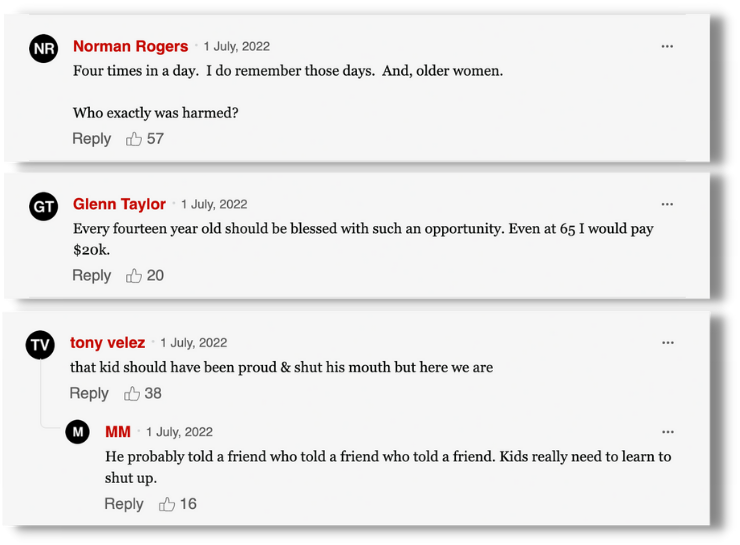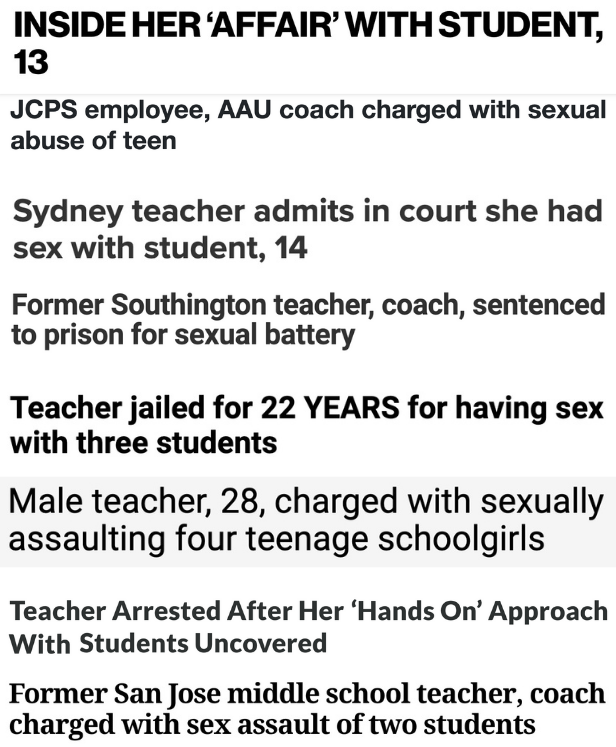We need to talk about the perception of and reception to this recent child sexual abuse case in Australia:


To clarify, I've chosen not to show the more obscene comments. I think these ones get the point across. There are hundreds like these on this article alone.
There is a culturally condoned belief that, if the abuser is female, boys should feel "lucky" rather than victimized (Dimock, 1988; Hunter, 1990). This, among other reasons, leads to the sexual abuse of boys being grossly under-reported (O’Leary & Barber, 2008; Hunter, 2011).
Telling a boy that he should "shut his mouth" and that "kids really need to learn to shut up" is probably among the most damaging things you can say.
Research regarding teachers' sexual misconduct has identified another belief that, if the child is male, the conduct is regarded as less serious (Frketic & Easteal, 2010), even though there is no strong empirical evidence that one sex is more vulnerable to negative consequences of abuse than the other, or that abuse affects girls and boys differently (Maikovich-Fonga & Jaffeeb, 2010)
Asking "who exactly was harmed?" shows an enormous lack of understanding and compassion, as does suggesting that "every fourteen year old should be blessed" with an "opportunity" to be sexually abused.
There is a recognized reverse double standard when it comes to perceptions of student-teacher sexual relationships, with female teachers judged less harshly than male teachers (Fromuth et al., 2001; Howell et al., 2011)
For example, compare the following headlines about similar situations:

Once you notice this, you'll see it over and over again:

When the teacher is a woman, the relationship is perceived to be less detrimental to the student, the student to be more mature and responsible, and the relationship as more acceptable (Russell & Gruys, 2021).
There is some evidence to suggest that this perception leads to male teachers receiving harsher penalties than female teachers (Simmon, 2012). However, other research has found that male teachers are older and more likely to have perpetrated more severe and lengthier sexual abuse and previously received warnings (Christensen & Darling, 2020).
There are instances of judges acknowledging this phenomenon. For example, in a 2015 sentencing, Circuit Judge Nanci Grant stated that if the case had involved a male teacher having sex with a 15-year-old female student, "there would be people here hanging from the ceiling trying to get every drop of blood." She went on to say, "But because it is a woman, there seems to be a winking about what happened."
Thankfully this is being recognised at some level, albeit after abuse happens.
It is also important to note that a 2019 study by the Canadian Centre for Child Protection Inc. of sexual abuse by K-12 school personnel found that 87% of offenders were male. Additionally, men are less likely to hold the teacher responsible and more likely to indicate positive student outcomes while women are more punitive toward the teacher (Muniz & Powers, 2019).
All this is to say that there are serious issues when it comes to child sexual abuse, one of which is the downplaying of boys' experiences and the disgusting interpretations that some adult men make about sex and masculinity.

